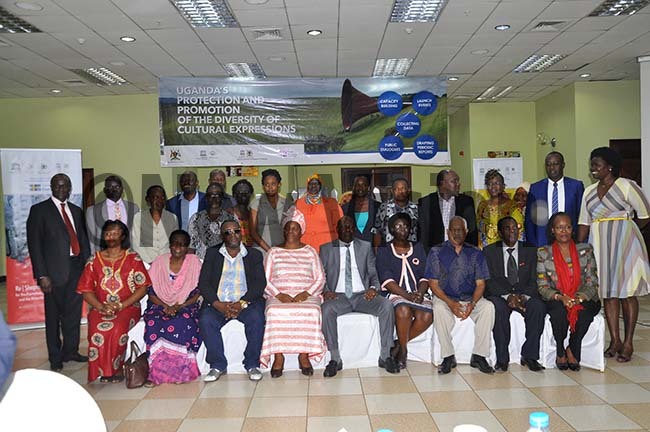Artists cry out to government for help
The artists who were among the stakeholders invited for a breakfast meeting accused the Uganda Revenue Authority (URA) of over taxation.
ARTISTS ENTERTAINMENT
KAMPALA - Ugandan artists have cried out to the government for help. They want a supportive environment that allows them to thrive and earn from their creative works.
The artists who were among the stakeholders invited for a breakfast meeting to unveil the commencement of Swedish funded research on the culture and creative industry data and policy accused the Uganda Revenue Authority (URA) of over taxation and government of failing to put in place mechanisms that protect their works.
They also accused the government of failing to broker deals with other countries to grant them mobility. The meeting was organised by the ministry of Gender at Imperial Royale Hotel, Kampala.
They argued that if the government would support the industry and allocates funds for its growth, it would reap big in terms of revenue and addressing youth unemployment in the country.
Fagil Mandy, an educationist, and author noted that in an era where robots are slowly replacing humans in places of work, the creative industry remains the only untapped goldmine that will address unemployment in the country.
"The creative industry is a gold mine but who is protecting it? Who is protecting our work? We are not protected," he said.
 Artists posing for a picture with stakeholders after the breakfast meeting. Photo by Nancy Nanyonga
Artists posing for a picture with stakeholders after the breakfast meeting. Photo by Nancy Nanyonga
Globally, the culture and creative industry (CCIs) employs 30 million people. The majority of these are aged between 15 and 29 years.
This means that the industry employs more people than the car industries of Europe, Japan and the US combined.
The industry contributes $2,250 trillion to global revenue, accounting for 3% of the world's GDP, according to UNESCO.
In developed economies such as Japan, downloading copyright-protected content attracts hefty penalties. One can easily end up in jail for downloading a song.
Charles Batambuze, the Chief Executive of Uganda Reproduction Rights Organisation (URRO) noted that unlike these countries, Uganda has no structure that protects their Intellectual Property from being reproduced or used without permission.
He noted that in the current digital era, their works are being freely downloaded and shared across platforms, thus impeding them from earning from their property.
"We need a special levy put in place so that we can earn from any work each time it's shared or downloaded," he said.
Faisal Kiwewa, the founding director of Bayimba Cultural Foundation, noted that countries like Kenya and Tanzania charge a fee for foreign artists to perform in their country in order to protect the local artists.
"Tanzania charges each artist who performs in their country. For example, when we went for the Basara festival, the organizers paid $700 dollars for each member of the group who travelled to perform there," he said.
Stressing the need to fund the sector, Amos Tindyebwa, an economist, noted that CCIs contributed approximately 3% of the country's total GDP in 2017 (BOU & IMF)
Quoting the 2014 Uganda Bureau of Statistics study, he said the industry annually contributes sh11.3bn in tax revenue and sh2.6bn in the license fee.
"Government should apportion part of this revenue to support the creative and culture industry," he said.
Rosie Agoi, the Secretary-General Uganda National Commission for UNESCO, called for investment in the industry noting that six of the Sustainable Development Goals (SDGs) are linked to it and without proper attention to CCIs; the goals may not be achieved.
Peace Mutuuzo, the minister of state for gender and culture, said she will petition the speaker of parliament and the minister of finance to ensure that there is a local fund for the industry.
"We need our local funding which is sustainable. You only need to invest once in the creative industry and you will receive a multiplier which is sustainable," she said.
Charles Bakabulindi, the minister of state for politics, noted that protecting and promoting intellectual property is pertinent for the long-term survival of humanity and the conservation of indigenous cultures.
"Culture and creative economies provide opportunities for society to recognize and cherish lifestyles, appreciate diversity, peace and mutual respect that provide the bedrock for social economic and political transformation of the country," he said.